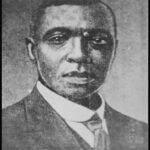ABDURAHMAN, ABDULLAH
- 5 Min Read
Abdullah Abdurahman (December 3, 1872 February 20, 1940), was the major political leader of South Africa’s Coloured people from 1905 until his death. He was a well-educated man and a powerful speaker who set the tone in Coloured politics in the first half of the 20th century.

PHOTO CAPTION: Abdullah Abdurahman. SOURCE: EA Library.
He was born in District 6 of Cape Town to “Cape Malay” parents. Although his grandparents had been slaves, they became wealthy and bought their freedom. His father was a teacher. Abdurahman attended the Marist Brothers College and the South African College (later the University of Cape Town). After he graduated, a colour bar was established at the South African College. His family then moved to Britain so that the younger sons could also receive an education. Abdurahman graduated from medical school at the University of Glasgow in 1893. He returned to Cape Town in 1895, along with his Scottish wife.
Resenting the discrimination against Coloured people in Cape Town, he entered politics to fight for Coloured rights. He joined the African Political (later, People’s) Organisation (APO) around 1903. His education and oratorical skills made him a leader, and in 1905 he was elected president of the APO, a position he held for life. In 1904, he was the first black to be elected to the Cape Town City Council, and held this seat until his death (except for an interval from 1913-15). In 1914, he was elected to the Cape Provincial Council, another seat which he retained for life.
In all the posts he held, he worked to protect Coloured rights. He feared the creation of the Union of South Africa, because he thought that the laws of the Union would probably embody the racial attitudes of the Transvaal and Orange Free State, particularly the colour bar which prevented Coloureds from competing with whites for jobs. In 1909 he went to London, with J.T. Jabavu and W.P. Schreiner, to protest (unsuccessfully) the inclusion of a colour bar in the Union constitution. Despite this failure, he continued to protest the colour bar, and the constitution which enshrined it, throughout his career.
He addressed the general public through his speeches to the APO. His favourite tactic was to point out the differences between the “British principles” which supposedly governed South Africa, and the harsh realities of white rule. He also criticised the whites of the Transvaal and the Orange Free State for their inhumanity and their preoccupation with race.
While his oratorical style won him support, his attacks gave Coloureds little information about how to strengthen their position in society. In speeches, he advised Coloureds to act and work in such a manner that whites could not dispute Coloured claims to equal rights. Away from the speakers’ platform, however, he made other contributions to the Coloured community.
Believing that better education would improve the Coloureds chances of success, he helped the establishment of Trafalgar High School (1911), the Rahmanijeh Institute (1913), and Schotse Kloof Primary School (1931). Realising that Coloured workers needed help, he formed the APO Federation of Labour, the South Africa Workmen’s Cooperative Union, and the Bootmakers’ Union, all in August 1919. He believed that Coloured unions were necessary since white unions often prevented Coloured workers from practising their trades.
Abdurahman was able to establish these schools and unions because of his position within the white political structures. He campaigned for the Unionist Party, the South African Party, and the United Party, and the leaders of these parties helped him remain in the municipal and provincial councils where he could assist his constituents.
Although his first concern was for the Coloureds, his concern for the rights of Indians and Africans grew throughout his career. In 1906, when he had gone to London with other representatives of the APO to protest that Coloureds were being subsumed under the terms set out for “natives” in the Treaty of Vereeniging (1902), he referred to Africans as “barbarous natives.”
By 1910 however, he had realised that Coloureds, Africans, and Asians could benefit from co-operating on specific grievances. He consequently organised the Non-European Conferences of 1927, 1930, 1931, and 1934. These meetings promoted co-operation and discussion among blacks, but no concrete changes arose from them. Despite his changing politics, Abdurahman never accepted the idea of a non-racial society. He remained opposed to the “social” mingling of the races throughout his life.
By the 1930s, younger Coloured politicians were challenging Abdurahman’s leadership. They believed that his policy of waiting for the white population to realise that the colour bar hurt everyone had failed and that if South Africa was to change, Coloured men and women would have to change it for themselves. Among the most outspoken of these young politicians were Abdurahman’s daughter, Mrs. Cissy Gool, and her brother-in-law; Dr. Goolam H. Gool. Although these younger politicians did not take control of Abdurahman, they did discourage him.
Abdurahman was dedicated to South Africa and believed that he could bring the reforms he envisioned to fruition by working within the existing political structure.
LEONARD LESLIE BESSANT




